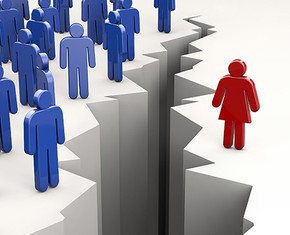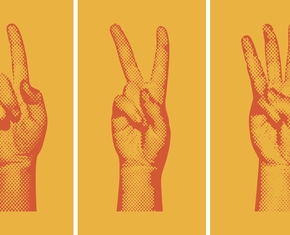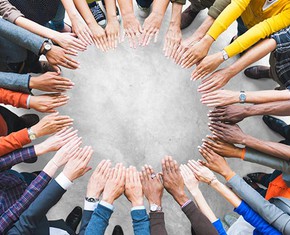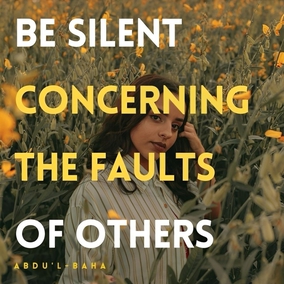The views expressed in our content reflect individual perspectives and do not represent the authoritative views of the Baha'i Faith.
Baha’is believe that prejudice forms the greatest barrier to universal peace—that humanity must unify in order to stop violence, conflict and war.
While visiting the West, Abdu’l-Baha repeatedly addressed the imperative issue of human oneness. An extract from a talk he gave in 1912 in Chicago at the Fourth Annual Conference of the National Association for the Advancement of Colored People explores the concept that humanity is created in the image of God:
Let us now discover more specifically how he [man] is the image and likeness of God and what is the standard or criterion by which he can be measured and estimated. This standard can be no other than the divine virtues which are revealed in him. Therefore, every man imbued with divine qualities, who reflects heavenly moralities and perfections, who is the expression of ideal and praiseworthy attributes, is, verily, in the image and likeness of God. If a man possesses wealth, can we call him an image and likeness of God? Or is human honor and notoriety the criterion of divine nearness? Can we apply the test of racial color and say that man of a certain hue—white, black, brown, yellow, red—is the true image of his Creator? We must conclude that color is not the standard and estimate of judgment and that it is of no importance, for color is accidental in nature. The spirit and intelligence of man is essential, and that is the manifestation of divine virtues, the merciful bestowals of God, the eternal life and baptism through the Holy Spirit. Therefore, be it known that color or race is of no importance. He who is the image and likeness of God, who is the manifestation of the bestowals of God, is acceptable at the threshold of God—whether his color be white, black or brown; it matters not. Man is not man simply because of bodily attributes. The standard of divine measure and judgment is his intelligence and spirit.
Therefore, let this be the only criterion and estimate, for this is the image and likeness of God. A man’s heart may be pure and white though his outer skin be black; or his heart be dark and sinful though his racial color is white. The character and purity of the heart is of all importance. The heart illumined by the light of God is nearest and dearest to God, and inasmuch as God has endowed man with such favor that he is called the image of God, this is truly a supreme perfection of attainment, a divine station which is not to be sacrificed by the mere accident of color. – The Promulgation of Universal Peace, p. 70.
 On many other occasions Abdu’l-Baha likened humanity to a flower garden in which different hues and colors combine in a scene of wondrous beauty, or to different notes in musical chords designed to blend in perfect harmony. In this way he demonstrated that each group has a legitimate contribution to make to the beauty of the whole, and that the overall variety enhances, in turn, the beauty of each constituent part.
On many other occasions Abdu’l-Baha likened humanity to a flower garden in which different hues and colors combine in a scene of wondrous beauty, or to different notes in musical chords designed to blend in perfect harmony. In this way he demonstrated that each group has a legitimate contribution to make to the beauty of the whole, and that the overall variety enhances, in turn, the beauty of each constituent part.
Baha’u’llah taught that an individual’s words should not exceed his deeds. Plenty of people profess high ideals, but their deeds don’t live up to those ideals. Many make an outward show of piety or philanthropy, hoping to increase their reputations. Jesus Christ condemned the hypocrisy of such people, and Baha’u’llah said that the proof of a person’s sincerity lies in action, not words.
Abdu’l-Baha, observing that prejudice is one of the great barriers to peace, emphasized that freedom from prejudice must be more than just an ideal—it must be translated into practice to such an extent that it influences all of our interactions with others.
As Abdu’l-Baha traveled throughout the United States and Canada in 1912, he readily acknowledged the many material and social accomplishments of the North American people and praised their high ideals. Yet he also offered a clear-eyed and uncompromising assessment that America fell far short of its vision for equal rights, racial equality and justice.
In particular, he pointed out the injustices perpetrated by whites against blacks, who, decades after gaining freedom from slavery, still suffered from severe bigotry, discrimination, and frequent violence. Abdu’l-Baha publicly warned the people of America that blood would run in the streets of its cities if the issue of racial prejudice were not dealt with—a prediction that has come true many times over.
You May Also Like
Comments

















In Cincinnati we have been attending monthly interfaith meetings at which sincere believers of Jewish, Christian, Moslem and Baha'i backgroups discuss issues like love and how to find God
and to share how our Faiths have freed us from such ignorances as popular prejudices. Such
meetings are opportunities to see the reality of a unity largely ignored otherwise.
Abdu'l-Baha : The Promulgation of Universal Peace Part 1
Thanks